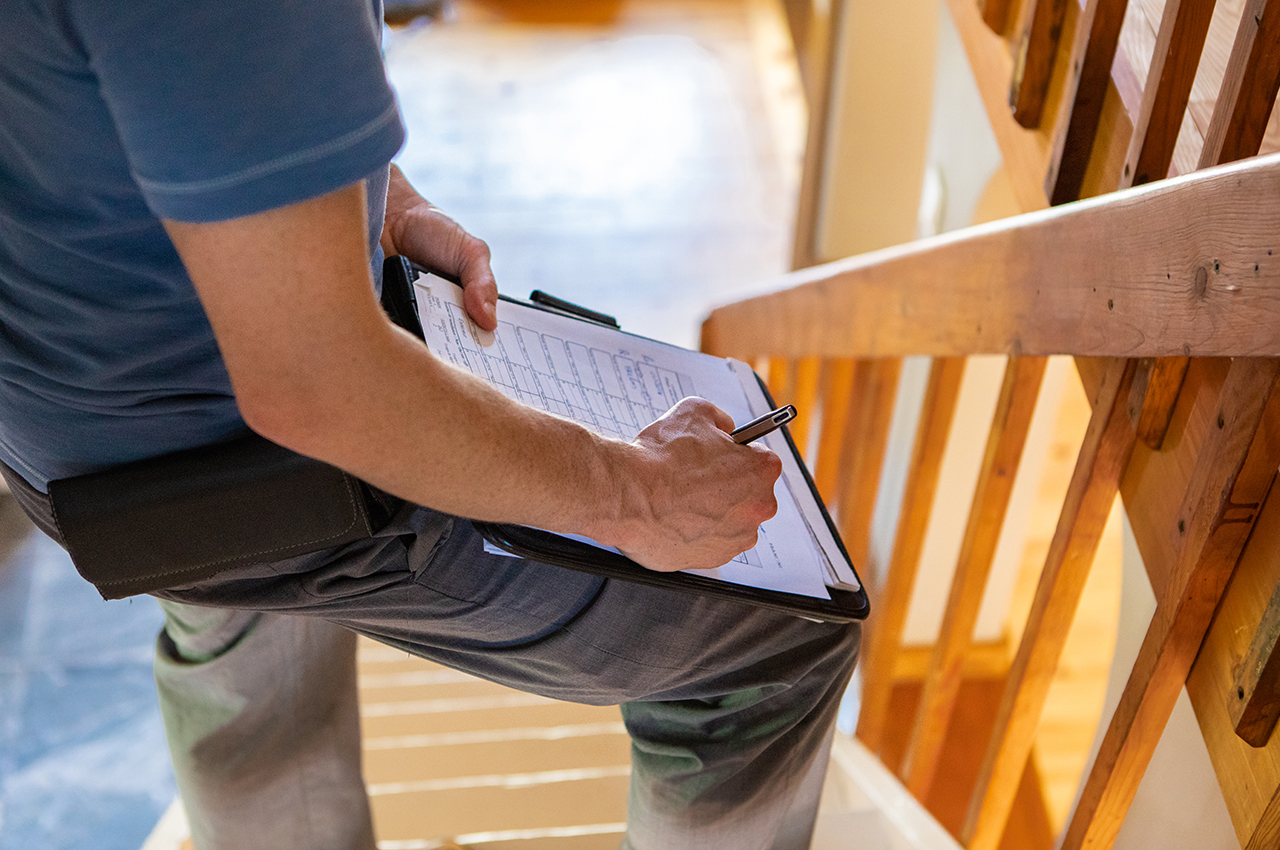The ultimate first-time buyer checklist: what to do at every step of your home purchasing journey

It’s an exciting time of your life when you are ready to purchase your first home. There is a great sense of achievement that comes with it, and it’s well deserved! However, house buying is not a simple and quick process – it tends to get pretty stressful. Hence why we have put together this first-time buyer checklist to guide you through every step of the way. This checklist will cover everything you need to know. Let’s dive in!
Download our complete ‘buying your first home’ checklist here.
First-time buyer checklist: Pre-purchase steps
It can take months to complete the purchase of your first home and during that period you’ll need to be prepared to undergo plenty of checks, fill in lots of paperwork and look at a range of properties. Our first-time buyer checklist simplifies this to ensure you don’t miss anything important.
- Deposit – Prior to even considering purchasing your first property, you will need to save up for a deposit. This can vary from 5% – 20% and it depends on the size of the home you choose.
- Budget for additional fees – You will also need to budget for additional fees such as solicitor fees and stamp duty.
- Find a mortgage advisor – Speak to a mortgage advisor about how much you’ll be able to afford and how much you’ll be able to borrow. This will give you a good idea of how much you can lend and what price range you should be looking at. Be honest with your expenses and debts as giving false information is a crime.
- Acquire a Mortgage In Principle – Once you have spoken to a mortgage advisor you can get a mortgage in principle from your chosen mortgage provider. This is an agreement that a lender will give you a specific amount towards your mortgage subject to further checks such as a hard credit check.
- Look for properties – The best places to look are Rightmove and Zoopla, you can also ask local estate agents about properties on the market. When you see one you like, contact the estate agent and arrange a viewing. There are also best times to look for a new property For instance, the property market is generally slower in winter, so if you are fortunate enough to be able to wait a bit then you may get yourself a better deal in winter.
- Viewings – Visit a few different properties, it’s always a good idea to look around. You don’t want to jump into things too fast as it’s a big decision and once you’ve bought the house there’s no going back in terms of time and money if you don’t like it.
- Consider solicitors / conveyancers – Estate Agents, mortgage lenders and sellers will almost certainly require you to use a solicitor or licenced conveyancer. Their services will also give you the peace of mind that you are navigating the process by the letter of the law. Money-savvy sellers will start shopping around for one once they’ve found several properties they’re interested in by checking reviews and comparing quotes. This will ensure that you won’t stall the process.
- Make an offer – Once you’ve decided on the property for you, then you can put in an offer. You can put in a lower offer, but it may not be accepted, so be tactical. Someone may offer the asking price; think carefully about how much you want the property and what you would be happy and able to pay.
- Arrange a survey – When your offer has been accepted, you’ll need to get a survey done on the property. This will identify any structural and cosmetic issues. You should always get a survey – if you don’t there could be repairs needed that could cost you thousands to fix.
- Complete the paperwork – Lastly, follow all the legal procedures for exchanging contracts and then you’ll own your first home.

First-time buyer expenses checklist
Multiple expenses come with buying a property and you need to be aware of all of them. These costs can add up, so you’ll need to make sure you’ve got enough money for everything.
The list below outlines each expense that you could be paying. Make sure to get quotes to find out how much each thing will cost you.
- Survey – You can opt for a basic survey for a more budget-friendly amount; however, this may be to the detriment of your future self as more expensive surveys will provide more detailed findings. Be aware that often this will be out of your control and to the lender’s requirements.
- Mortgage arrangement fees
- Stamp duty – note that, in 2017, first-time buyer stamp duty relief was brought in. This means that any first-time buyer purchasing a property worth £500,000 or less will pay no stamp duty on the first £300,000 of their purchase.
- Valuation of new property (the mortgage provider may charge a small fee for this).
- Buildings and contents insurance.
- Repairs, renovations and heavy-duty cleaning of the new house.
- Redecorating the new house to suit your taste.
- Hiring a moving van or company to pack and move your items.
- New furniture and fittings.

Home buyer inspection checklist
Before buying your new home, various checks need to be completed to ensure that there are no hidden surprises once you’ve bought the property. Using a home buyer inspection checklist can help you with this.
You can pay for a surveyor to carry out these checks, but it’s also good to do it yourself so you know exactly what to expect before moving in.
- Location – Check your new home is in the right place for you. Are there amenities nearby, good public transport connections, family and friends nearby or a good school if you have children?
- Structure – Ensure there are no obvious issues with walls the roof, ceilings and floors. If you see something and you are unsure about it then always ask for professional advice. Better safe than sorry!
- Electrics – Check for any issues with lighting, sockets, internet and phone signal.
- Plumbing – You can take a look at the plumbing and check for any obvious issues with pipes, the boiler, radiators, waste management system, bath, toilets etc.
- Gas – This is essential as issues with gas connections can be fatal.
- Gutters – Check for blockages and any damage.
- Doors – Check doors are sturdy, secure and properly fitted, you should also change the locks when you purchase a new home.
- Windows – Check whether the windows are double-glazed, whether they have proper locks and if openings are safe for children and pets.
- Stairs – If you have mobility issues, then a steep staircase could be an issue for you. Check for creaking and if the staircase is safe to use.
- Garage – Check the garage is watertight if you want to use it for storage. Also, check that it will be emptied by the previous owner before you move in.
- Loft – Make sure the loft is watertight and that there are no signs of pests or asbestos.
- Odours – If you notice any odours when viewing the house, then this could be for numerous reasons. For example, the previous owners may have been smokers or had pets. If you think this will be a problem enquire about fixing it.
- Mould or damp – Check for signs of mould or damps as this can be costly to fix. If you’re unsure refer to your survey or get a damp and timber survey from a PCA-approved contractor.

First-time buyer checklist: after you’ve purchased the property
Once you’ve sealed the deal and you legally own your new home – congratulations – you can start the transitioning process. There’s plenty still to do before you have settled into your new home.
- Keep all your documents together and somewhere safe.
- Change the locks on your new property for security.
- Decide how you’ll be moving all your possessions. Will you do it all yourself and hire a van or do you need to get a moving company? You need to read our house moving checklist here to ensure you don’t miss anything and our packing checklist too so that nothing is missed and that everything is packed safely!
- Arrange child and/or pet care for the move-in day.
- Deep clean your old and new house; cleaning your old home will likely be part of your tenancy agreement, but either way, you should be considerate about the next people moving in.
- Use our previous checklist to update your new address with important organisations. This will include:
- Bank and creditors
- Legal departments such as the DVLA, HMRC and your TV Licence
- Employer(s)
- Utility companies
- Various store loyalty cards
- Children’s school and clubs
- Insurance companies
- Hobby subscriptions and memberships
- Health providers such as GPs, opticians, vets and dentists
- Connection companies such as phone providers, internet providers and entertainment subscriptions
- Get buildings and content insurance to protect yourself.
- Consider changing utilities to save money.
- Research and arrange schooling and children’s activities for your kids, if you have them.
It’s time to get cracking
Embark on an exciting journey with our first-time buyer’s checklist! As you move a step closer to homeownership, it’s crucial to make sure you’re fully equipped. Download your complimentary, printable checklist to have it readily available and ensure that you don’t miss any of the vital aspects of the process. This way, you can focus your energy on keeping stress as low as possible and making informed decisions for this significant milestone in your life!
